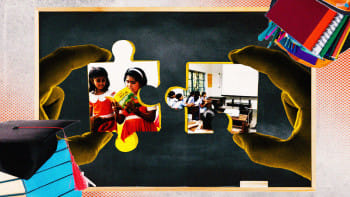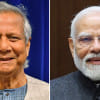An education memorandum

When Chief Adviser Prof Muhammad Yunus addressed the nation on August 25, two weeks after the student-led mass uprising put the interim government led by him in power, education was not expected to be on top of the agenda. But he did make four important points: i) the misrule of the past government has maimed the education system and has created chaos at all levels of education; ii) taking the initiative for a comprehensive reform in education is a pledge of the interim government; iii) work on developing a curriculum fit for the changing times will begin; and iv) an urgent task is to resume the activities of the educational institutions in a creativity-generating, safe and learner-friendly environment.
Speaking about the multitude of demands arising from the "state repair" agenda put forth by the mass uprising, Prof Yunus said, actions on various reforms have already begun and the process of consultation would have to continue. The interim government has to decide guidelines for the minimum reform targets to achieve, and where to begin. In this regard, the ultimate decision has to emerge through political consultation. The time frame for reform—i.e., the decision about the life span of the interim government—will also emerge from political dialogue involving all citizens, including students, he said.
A crippled education system
Fourteen years ago, the government adopted a national educational policy setting the guidelines for educational development. The key objectives of the 2010 policy remain unmet: i) a core unified curriculum for all types of school education with a minimum common standard of school provisions for all students; ii) major change in the professional training of teachers, their performance standards, their status and incentives, and assurance of adequate numbers; and iii) decentralised and accountable education governance, planning and management.
Researchers see development in sub-sectors of education as fragmented and partial, devoid of a holistic view of the sector. Government actions have not addressed the root problems; they have reacted to symptoms, often without success.
Public investment in education has remained at or below two percent of GDP—one of the lowest among developing countries. Under the present structure of planning, management and accountability, larger budgets are actually likely to create more waste, inefficiency and mismanagement.
We have not produced satisfactory learning outcomes due to deficits in planning, school management and accountability, and the absence of a holistic education vision. We don't have enough teachers with professional skills, commitment to teaching, and a career path for them as an incentive for performance.
Unlike other countries, comprehensive planning has been hindered by splitting school education into two ministries. As in other sectors, partisan political interests, rather than educational goals, have guided decision-making, especially in recruitment of personnel. Corruption, inefficiency and a lack of accountability have continued hand in hand.
The new school education curriculum, launched in 2022 with much fanfare, has become an example of partial and fragmented action without adequate preparation for major required collateral steps. The curriculum has caused widespread anxiety and confusion among students, teachers and parents. It has put students' future at risk.
The education priorities
As implied by Prof Yunus in his speech, the interim government needs help in at least two areas: a) advice on immediate and short-term steps required for restarting the educational institutions and their normal activities, getting rid of the egregious practices of the past that vitiated the academic operations and environment of the institutions; and b) ideas for long-term changes. The interim government may take up some major decisions; for others, a reform process may be initiated with the outcomes to emerge over a longer time frame.
Beyond listing the reform agenda, it is necessary to indicate mechanisms, action steps, and processes. Reforms should be articulated, action plans made, actions implemented, and progress monitored and evaluated.
Urgent and short-term actions
Restarting with a "new normal": The extraordinary recent events call for urgent actions. Students need to be in school and normal operations need to resume. A "new normal" has to be defined at each level of education, renouncing many past practices. At the university level, the University Grants Commission (UGC), in consultation with students and other stakeholders, should provide guidelines, but not seek to micro-manage. Each institution should consult students, teachers and parents at the school level in implementing the guidelines.
Right people at the right place: The recent spate of resignations in top university and other positions and the demand for resignations in institutions point to the need for the right people in the right place. Appointments must be based on merit, not political or other considerations. The process must ensure impartiality through clearly defined job qualifications and use of search committees. A professional UGC can facilitate the process and consult teachers and students. To fill the vacuum in administration, people may be placed in institutions and key education administration positions for a short term, with regular appointments made through due deliberation.
Elected student unions: With their sacrifice and maturity demonstrated in the recent popular movement, students have earned the right to a role in managing the education and co-curricular activities of their institutions. This opportunity should be created by forming non-partisan elected student bodies in institutions, beginning with universities and colleges.
Pause and rethink the new curriculum: The interim government has begun to take steps to address the ongoing contentious issues. Ad hoc decisions risk exacerbating the frustrations of stakeholders. A comprehensive and well-structured approach is necessary to ensure a smooth transition. Most educationists want a pause in the rollout of the new curriculum. In order to minimise disruption, two steps can be taken: i) textbooks already introduced in some grades under the new curriculum may continue and existing textbooks may be used for other grades; and ii) conventional end-of-year or public student evaluation based on written examinations should continue, separating formative and practical work-based evaluation in classrooms from summative written examinations.
A pause spanning a year or so should be used to review and rethink the curricular reforms, particularly student evaluation, a highly controversial aspect of the new curriculum, and effective implementation in classrooms. Experts and stakeholders should be involved in this rethink.
Medium-term actions
Initiate a continuous curriculum development process: The curriculum reform mechanism and process should be initiated in a holistic way for the entire school education, understanding the curriculum as an ongoing process rather than a singular event. Core subjects across all school systems are essential, while maintaining flexibility to allow students to seamlessly transfer between different educational pathways.
Increase education budget: A planned growth of the public education budget should be committed. NGOs with demonstrated capacity to perform should be supported to participate with the government in district- and upazila-based plans for inclusive early childhood, primary, secondary, and vocational education of acceptable quality.
Assessment of primary students' foundational skills: One of the priorities should be a national assessment of primary-level students' ability to read and do basic arithmetic, and actions based on the assessment to reach these targets. Bangladesh could adopt the simple biannual early grade ASER (Annual Status of Education Report) reading and arithmetic at-home surveys, which was pioneered by Pratham in India and adopted in several countries.
Invest in teachers: Steps should be taken to increase the number of teachers, strengthen the quality of teacher preparation, and provide teachers with a career path. Teachers' professionalism and performance are the pivot of change in education. A reimagined teaching profession should attract and retain the best talents in the profession. Teachers' and other education workers' preparation, performance standards, status, incentives, remuneration and career path should be redesigned and applied across the board for all schools, state and non-state. Teachers should be the role model for their students. This rethinking about teachers will be a longer-term task, but it should begin in earnest now.
Unify school education under one ministry: A unified government leadership and policy guidance should be established by bringing all school education, pre-school to pre-university, under one ministry. This would be important in the context of decentralising education governance with planning and decisions devolved to district, upazila and institutional levels.
Bring in industry experts: A programme should be initiated with businesses and private sector social enterprises to enhance employment generation and skill development. Good examples should be supported and employers' bodies should be involved in creating social businesses for employment generation and skill development.
Pilot projects in decentralising management: The decades-long talk about decentralising education governance should take concrete shape through initiating a pilot project of decentralisation, establishing district education authorities for finance, planning and management.
This list is not exhaustive. An education consultative group would consider and advise on both the short-term and medium- and longer-term policy questions, and might come up with other issues deserving priority attention. Being strategic means having a choice of actions with probable success, rather than attempting many things all at once.
From rhetoric to action: how to go about it
An education consultative group of experts and stakeholders should examine the status of and priorities in the education sector and advise the interim government. They would examine the issues and suggest actions on the matters noted above. They would help build a consensus on the longer-term vision. This group may be turned into a permanent, statutory commission, as recommended in the 2010 National Education Policy. The consultative group should consider priorities and steps related to SDGs and national goals for building an equitable, inclusive and quality education system for all.
This larger agenda would include: i) promoting an equitable society through education; ii) a time-bound plan for equitable and inclusive early childhood development and K-12 school education of acceptable quality for all; iii) strengthening the teaching profession and the education workforce in respect of their professional skills, motivation, performance and adequacy of numbers, as well as the effective use of digital technologies; iv) establishing decentralised district education authorities for planning and managing equitable K-12 education in every community; and v) ensuring academic autonomy of the education system and education institutions, protecting them from partisan politics.
As Prof Yunus envisaged, there has to be systematic consultation and dialogue with all stakeholders, not token gestures. The energy and idealism of students and the youth have to be harnessed to this end. A social compact on education has to be backed up by a political consensus.
The interim government is not expected to complete all the needed reforms. But if it realises at least some of the key reforms and charts the way ahead for others, it will have done justice to the sacrifices of students and citizens during the July-August movement.
The writers are co-authors of the book Political Economy of Education in South Asia: Fighting Poverty, Inequality and Exclusion (University of Toronto Press, 2022). It has been well-received, and national editions have been published in Bangladesh and Pakistan. Prof Ahmed has also written a book in Bangla focusing on Bangladesh, titled Ekush Shotoke Bangladesh: Shikkhar Rupantor (Bangladesh in the 21st Century: Transforming Education"), published by Prothoma in 2023.
Dr Manzoor Ahmed is professor emeritus at BRAC University.
Dr John Richards is professor emeritus of public policy at Simon Fraser University in Canada.
Shahidul Islam is a doctoral student at Queens University in Canada, and a former senior education adviser with the US Agency for International Development.
Views expressed in this article are the author's own.
Follow The Daily Star Opinion on Facebook for the latest opinions, commentaries and analyses by experts and professionals. To contribute your article or letter to The Daily Star Opinion, see our guidelines for submission.

 For all latest news, follow The Daily Star's Google News channel.
For all latest news, follow The Daily Star's Google News channel. 












Comments